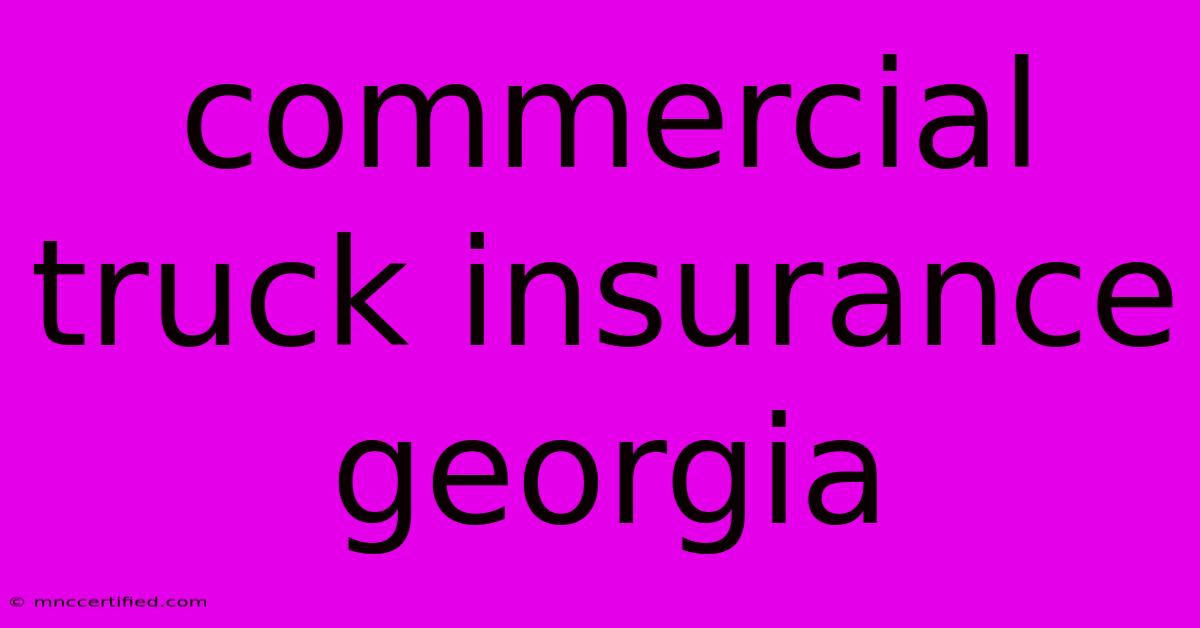Commercial Truck Insurance Georgia

Table of Contents
Navigating the Roads of Georgia: Your Guide to Commercial Truck Insurance
Finding the right commercial truck insurance in Georgia can feel like navigating a complex highway system. But understanding your options and knowing what to look for can significantly simplify the process and protect your business. This comprehensive guide breaks down everything you need to know about commercial truck insurance in Georgia, from the types of coverage available to finding the best policy for your needs.
Understanding Georgia's Commercial Trucking Regulations
Before diving into insurance specifics, it's crucial to understand Georgia's regulations concerning commercial trucking. The Georgia Department of Transportation (GDOT) sets strict standards for commercial vehicle operators, including licensing, safety inspections, and, importantly, insurance requirements. Failing to comply can lead to hefty fines and operational shutdowns. Understanding these regulations is the first step towards securing appropriate coverage.
Key Regulatory Considerations:
- Vehicle Classification: The type of vehicle you operate (e.g., straight truck, semi-truck, heavy-duty tractor) directly impacts your insurance needs and costs.
- Cargo Type: The type of goods you transport affects your liability exposure. Hazardous materials require specialized coverage.
- Operating Radius: Do you operate solely within Georgia, or do you cross state lines? Interstate operations require additional considerations and potentially higher premiums.
- Driver Qualifications: Ensuring your drivers possess the necessary commercial driver's licenses (CDLs) and meet safety standards is crucial, influencing your insurance rates.
Types of Commercial Truck Insurance in Georgia
Several types of commercial truck insurance policies cater to the diverse needs of Georgia's trucking industry. Choosing the right combination is vital for complete protection.
1. Liability Insurance: The Foundation of Your Coverage
This is the most fundamental type of commercial truck insurance. Liability insurance protects you against financial losses resulting from accidents you cause, covering bodily injury and property damage to others. In Georgia, liability insurance is mandatory. Consider factors such as your operating radius and the weight of your truck when determining the appropriate liability limits.
2. Physical Damage Insurance: Protecting Your Investment
Physical damage insurance covers repairs or replacement of your truck in case of accidents, theft, fire, or vandalism. This is a crucial protection for your significant investment in your commercial vehicle. Consider comprehensive and collision coverage options.
3. Bobtail Insurance: Coverage for Unhooked Tractors
If your truck operates without a trailer (bobtailing), you'll need bobtail insurance for liability and physical damage coverage during those times. This is a separate policy from your general commercial auto insurance.
4. Cargo Insurance: Safeguarding Your Goods
Cargo insurance protects against losses or damages to the goods you transport. This is crucial for businesses that transport valuable or high-risk cargo. The coverage amount should reflect the value of your typical shipments.
5. Non-Trucking Liability Insurance (NTL): Bridging the Gap
If you use your truck for both business and personal use, NTL insurance covers liability claims when the truck is not engaged in commercial activity.
6. Occupational Accident Insurance: Protecting Your Drivers
Occupational accident insurance offers coverage for medical expenses and lost wages for your drivers in case of on-the-job accidents, regardless of fault.
Finding the Right Commercial Truck Insurance in Georgia: Key Factors
Securing the best commercial truck insurance policy in Georgia requires careful consideration of several factors:
- Your Business Needs: Assess the risks specific to your operation – cargo type, operating area, driver experience.
- Your Budget: While comprehensive coverage is essential, balancing protection with cost is crucial. Shop around and compare quotes.
- Your Insurance Provider: Research reputable insurance providers specializing in commercial trucking. Read reviews and compare their offerings.
- Claims Process: Understand the claims process of your chosen provider. A smooth and efficient claims process is crucial during emergencies.
Off-Page SEO Strategies for "Commercial Truck Insurance Georgia"
To improve your website's ranking for "Commercial Truck Insurance Georgia", employ these off-page SEO strategies:
- Local Citations: List your business on relevant online directories such as Google My Business, Yelp, and industry-specific directories. Ensure consistency in your business name, address, and phone number (NAP).
- Link Building: Acquire high-quality backlinks from relevant websites in the trucking and insurance industries. Focus on earning links naturally through guest blogging, content marketing, and industry partnerships.
- Social Media Marketing: Engage actively on social media platforms, sharing valuable content related to commercial trucking and insurance in Georgia.
- Online Reviews: Encourage satisfied customers to leave positive reviews on relevant platforms. Positive reviews boost your online reputation and search ranking.
- Community Involvement: Participate in local trucking events and community initiatives to build brand awareness and credibility.
By understanding Georgia's regulations, choosing the right coverage, and employing effective SEO strategies, you can find the commercial truck insurance that best protects your business and keeps you on the road to success. Remember to regularly review your policy to ensure it continues to meet your evolving needs.

Thank you for visiting our website wich cover about Commercial Truck Insurance Georgia. We hope the information provided has been useful to you. Feel free to contact us if you have any questions or need further assistance. See you next time and dont miss to bookmark.
Featured Posts
-
Maga Coin Price Prediction 2030
Nov 23, 2024
-
Cher And Director Clash
Nov 23, 2024
-
Euro Millions Results Fridays 158m Draw
Nov 23, 2024
-
Chinas Fujian Carrier Sea Trial 5
Nov 23, 2024
-
Satellite Views Chinese Warship
Nov 23, 2024